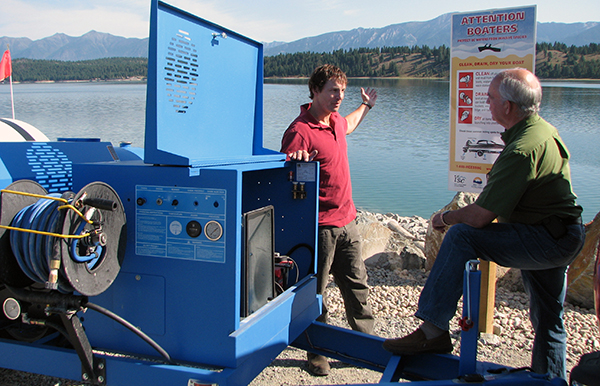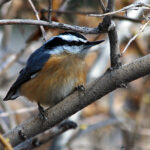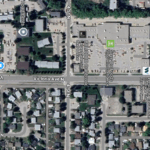Home »

Aquatic invasive species disaster looming
Marty Hafke, program coordinator for the East Kootenay Invasive Plant Council, recently met with Kootenay East MLA and Minister of Community, Sport and Cultural Development Bill Bennett to discuss what may be the largest environmental threat to B.C.
Invasive mussels such as the Zebra and Quagga mussel were first introduced to the Great Lakes in the mid 1980s and have since spread across the United States primarily by watercraft moving from one water body to another, in some cases over thousands of kilometers. To our knowledge they are not yet present in Canada from Manitoba west. The northwestern U.S. is another holdout with no known mussel infestations in Oregon, Washington, Idaho, Montana and Wyoming.
Many U.S. States such as Idaho have implemented strict regulations requiring Boats to stop at inspection stations to ensure they are not harboring live mussels which can live for up to 30 days out of water. In Idaho alone this year they have intercepted 56 mussel fouled boats, six of which were bound for B.C. and three for Alberta. Sixteen of those fouled boats intercepted in Idaho this year were travelling from the Great Lakes.
“If an infested boat can travel from the Great Lakes to Idaho then one can assume that a boat could make that same trip through Canada,” says Hafke. Yet B.C. has no requirement for boats to be inspected (neither does Alberta nor Saskatchewan). Trends in Idaho, Montana and other states are showing an increased number of infested boats being found at inspection stations.
“I have been a strong advocate for the fight against invasive plant species. This new challenge is easily as serious,” says MLA Bennett.
“This is a classic case of an ounce of prevention being worth a pound of cure,” adds Hafke. Or more likely a ton of cure when you look at the costs these tiny mussels can incur. The US Fish and Wildlife Service estimated impacts to be greater than $120 billion. If the Columbia River Basin were infested, the costs in the U.S. are estimated at over $25 million. And that’s not a one-time cost – that’s per year, every year.
With much-appreciated funding from the Columbia Basin Trust, the East Kootenay Invasive Plant Council has already taken the preventative measure of purchasing a mobile boat decontamination unit that is capable of decontaminating a mussel fouled boat, the first of its kind in Western Canada.
“This unit does nothing if we can’t find the infested boats coming into our region in the first place,” says Hafke. “This is where we need the provincial government to rapidly step up and introduce regulations to require boats to be inspected as they are in the US. We don’t have time to spare, this needs to be in place for 2013. We know from past efforts by MLA Bennett that he gets things done and we’re counting on him again to pass this crucial message on to other law makers.”
Submitted







